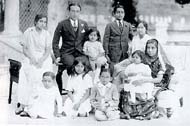Rebel With A Cause
Mridula Sarabhai, born into Ahmedabad's celebrated industrial dynasty and nuclear scientist Vikram
Sarabhai's sister, was one of those amazing women who fought for India's freedom. After the midnight hour, she
grew disillusioned with the Congress, rejected the lure of high office and championed the unpopular cause
of Sheikh Abdullah for the last twenty years of her life, even going to prison for defending the Kashmiri leader.
Aparna Basu, who has just published Mridula's biography, recounts Sarabhai's fearless commitment
to saving human life during the horrific trauma of Partition.
 A trainload of Hindu and Sikh refugees were to be repatriated
from Bannu, NWFP, to India via Lahore. The train could come either
via Gujrat (in Pakistan) or Sargoda. Gujrat was still in turmoil
and taking the train that way was hazardous. The deputy high commission
was told that the train would arrive in Lahore via Sargoda,
but it did not. It was deliberately diverted at the last moment
and taken to Gujrat where the passengers were brutally looted,
raped and massacred.
A trainload of Hindu and Sikh refugees were to be repatriated
from Bannu, NWFP, to India via Lahore. The train could come either
via Gujrat (in Pakistan) or Sargoda. Gujrat was still in turmoil
and taking the train that way was hazardous. The deputy high commission
was told that the train would arrive in Lahore via Sargoda,
but it did not. It was deliberately diverted at the last moment
and taken to Gujrat where the passengers were brutally looted,
raped and massacred.
News of the tragedy reached Lahore but representatives
of the deputy high commission were told not to go to
Gujrat and even the higher commissioner was not allowed to go.
Mridula had returned to Lahore from Delhi on the previous night
and the moment she got news of the attack, she contacted Sri Prakasa,
the Indian high commissioner, on the telephone. He assured her
that he would do the needful and cautioned her not to take any
undue risk.
She then got in touch with Khan Qurban Ali Khan, inspector
general of police of West Punjab, and told him that she was proceeding
to Gujrat. He had great regard for Mridula and told her not to
come as they were making arrangements for bringing the injured
passengers to Lahore. But this did not satisfy her and she asked
him either to provide her with a police officer as an escort or
warned him that she would proceed on her own.
Qurban Ali Khan
was taken aback on hearing this but knew the futility of arguing
with her. He reluctantly provided two police officers to accompany
her. They drove throughout the night and reached Gujrat early next
morning to find the station strewn with corpses and wounded men
women and children.
She immediately took charge of the situation,
got the dead, wounded and alive separated, arranged milk for the
surviving babies, saw that the wounded were removed to Gangaram
hospital in Lahore and the rest were taken to the nearest transit
camp for Hindu and Sikh refugees at Gujranwala.
The survivors
were heard saying that the Goddess herself had come to their rescue
in the form of Mridula. She did not leave the station till every
dead person was identified and the remains disposed off according
to Hindu rites.
Mridula received information that two refugee trains had already
left for Amritsar carrying Muslim passengers and that a plan was
afoot to take revenge for the Bannu episode by killing the passengers
of these trains at Amritsar. She therefore telephoned from Delhi
to Kamalaben Patel who was working closely with Mridula in Lahore
and asked her to rush to Amritsar, contact the district collector
and ask him to make the necessary arrangements for the safety
of the passengers on these trains.
When Kamlaben conveyed this
message to him, he was not very happy. But Mridula wielded so
much authority in those days that officers were afraid to ignore
her instructions. On her way back from the collector's house,
Kamlaben saw a huge crowd trying to remove the rail tracks near
Amritsar railway station, but timely intervention averted the
disaster. The episode revealed Mridula's ability to act quickly
and firmly under critical conditions.
Excerpted from Mridula Sarabhai, Rebel With A Cause, by Aparna Basu, Oxford University Press, 1996, Rs 425, with the publisher's permission. Readers in the US
may secure a copy of the book from Oxford University Press Inc USA, 198, Madison Avenue, New York, New York 10016, USA. Tel: 212-726-6000. Fax: 212-726-6440.
| 
